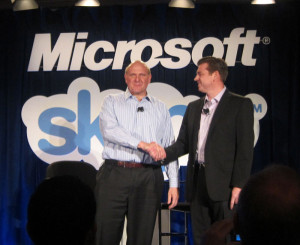Microsoft's acquisition of Skype is compatible with European Union competition law, the General Court of the E.U. ruled Wednesday.
Cisco Systems and Italian Internet communications service provider Messagenet had asked the court to overturn an October 2011 European Commission decision to approve the merger. The court handles actions against the institutions of the E.U.
The companies had previously asked the Commission to prohibit the $8.5 billion deal announced by Microsoft in May 2011, claiming it was anti-competitive, but the Commission said it did not give rise to competition concerns.
On Wednesday, however, the Luxembourg-based court issued a ruling dismissing the action in its entirety.
Even though the acquisition of Skype enables Microsoft to hold an 80 to 90 percent share of consumer video communications on Windows PCs, counting Skype and Windows Live Messenger services together, that is but a segment of the overall consumer communications market in which Microsoft will face competition, the court said.
The consumer communications sector is fast growing and is characterised by short innovation cycles, the court said. Because of this, large market shares may turn out to last for only a short time, it added. Moreover, Microsoft is less present on new operating devices such as tablets and smartphones, which are becoming increasingly important on the consumer communications market, the court added.
"Any attempt to increase prices of communications for users of PCs might encourage them to switch to alternative devices," the court noted. Since services on that market are usually provided for free, a commercial policy of making users pay would run the risk of encouraging users to switch to other providers continuing to offer their services free of charge, it added.
Furthermore, competing operators have sufficiently large market shares on other devices than Windows PCs, the court said. Therefore the merger is compatible with the E.U. competition rules, it added.
The court also rejected the argument that Microsoft would behave anti-competitively if it decided to make it easier for its enterprise videoconferencing and chat service Lync to interoperate with Skype than for competing products.
Such preferential interoperability could be to the detriment of its competitors, the companies had argued. While this in theory might enable Microsoft to restrict competition, it is not certain that this would occur within the three-year time span evoked by the Commission in its decision, the court said. Lync also faces competition from other players on the enterprise communications market, such as Cisco, which holds a larger share of the market than Microsoft, the court said.
Microsoft and the Commission welcomed the court's confirmation of the earlier ruling.
Messagenet and Cisco have two months from the date of notification of the court's decision to lodge an appeal on a point of law.
Cisco said in an emailed statement that it is disappointed the court did not require the commission to revisit interoperability requirements for the merger, but that it is still hopeful Microsoft and others in the industry will work together to achieve an open, interoperable video community. A Cisco spokeswoman did not respond when asked whether Cisco planned to appeal the ruling.





